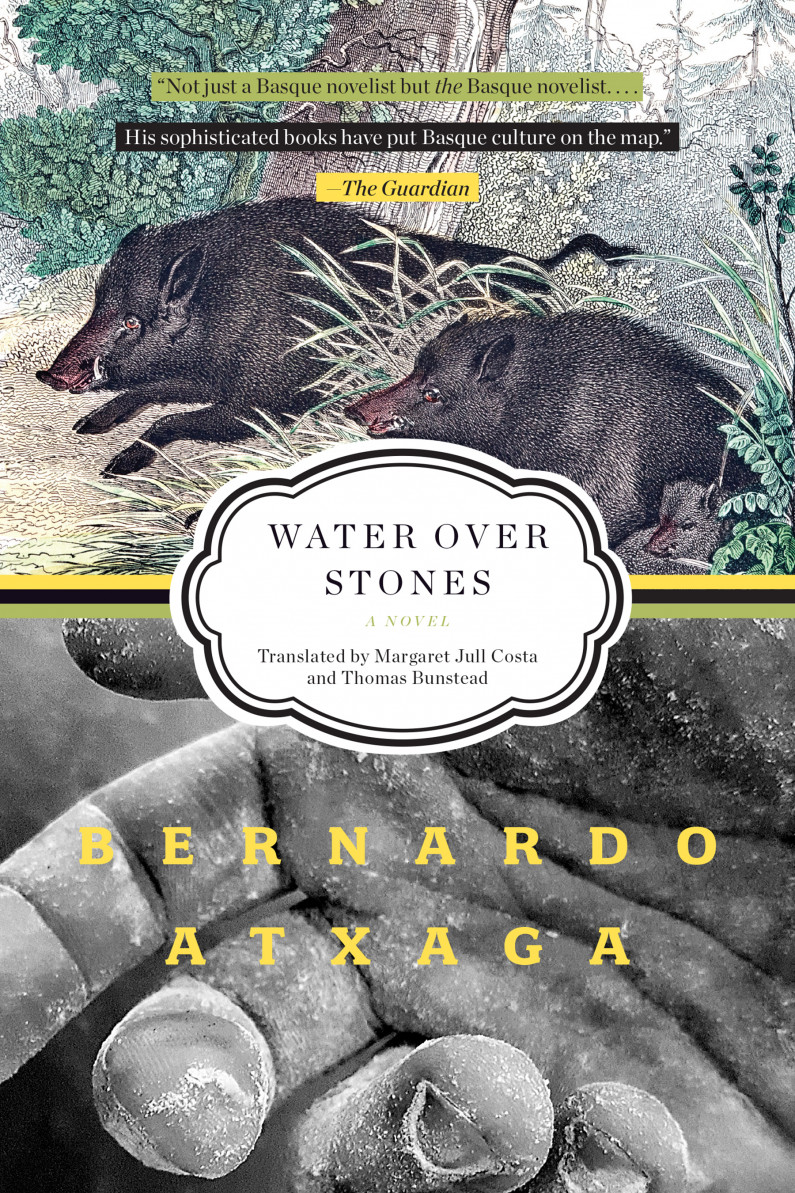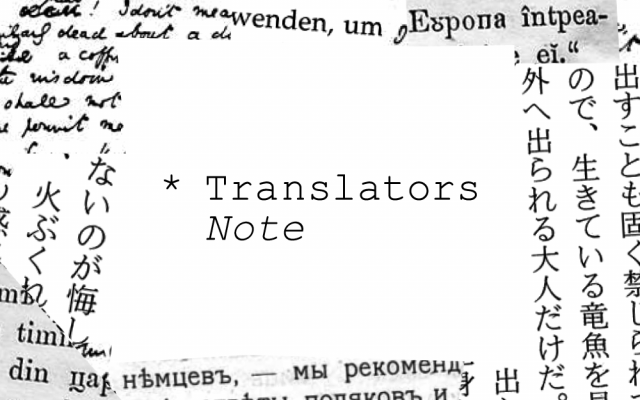Review: Water Over Stones

Water Over Stones
By Bernardo Atxaga
Originally translated from the Basque into Spanish by Asun Garikano and the author; present edition translated from the Spanish by Margaret Jull Costa and Thomas Bunstead
Graywolf Press, 400 pp., $18.00 (paper)
Review by Kevin Smith
In a scene in Bernardo Atxaga’s luminous new novel Water Over Stones, four young Spanish soldiers, serving near the end of Franco’s regime, pause from their duties to look at the sunset above the Basque countryside. “Vapour trails striped the sky, some still very clear, others already blurred, with orange, red and yellow stripes in among the more subtly coloured clouds, which were pinkish, greyish, greenish … One of the four friends sitting on the rocks at the top of the hill could have turned to the others and said: ‘Isn’t this a beautiful moment, with the night gently approaching?’ But though all felt this, none could put it into words and so they said nothing.”
A different kind of silence launches the novel’s action. Elías, an adolescent boy, has been sent by his widowed mother to a parochial school in Pau, France, for a summer of learning French. There he meets Mateo, a boy with the greater confidence of his well-off upbringing; the two become fast friends. Soon their friendship leads to physical affection. The novel treats their budding feelings for each other with tremendous care: “They lived in a state of dazed rapture, awaiting the night. After lights out, when Mateo picked his way through the cave-like darkness to Elías’ bed, all the heaviness of the day, indeed of their whole lives until then, melted away.” In this spiritual setting, the boys are discovering the gift and refuge of friendship. But this is 1972, and the world is not always kind to the tender-hearted.
After a sequence of traumatic incidents, Elías is silent; he cannot or will not speak. He is removed from the school and sent by his mother to stay with his uncle in the mining town of Ugarte, in the Spanish Basque Country, in the hopes that in this new setting he will regain the power of speech. He meets his cousins, Luis and Martín, as well as Eliseo, one of the quiet soldiers mentioned above, who now works at the uncle’s bakery. An encounter with a wild boar proves pivotal for Elías.
The novel moves through its characters’ lives with a remarkable synthesis of intricacy and vision. Events occur, actions have consequences, but what matters more to this novel are the inner worlds of its characters, the flow of water beneath what is visible on the surface.
Eliseo, perhaps the novel’s most compelling character, draws the reader into the Basque landscape that forms a vivid element of Atxaga’s fiction. Eliseo adopts a young magpie as a companion; sleeps with a boisterous local woman; is outraged that a nearby forest, “a paradise for hunters,” should be reserved for the exclusive use of General Franco, Prince Juan Carlos, and their “collaborators and colleagues.” Eliseo wants to hunt there, too. He visits the deathbed of his dying father, who abandoned Eliseo when he was fourteen. The visit, far from offering the forgiveness the father craves, only fills Eliseo with anger. Back at his military base, he joins a group of other soldiers watching photographic slides of African game. The images of animals slip into his dreams, first of lions, then dogs: “Eliseo was down on all fours among the dogs, and their breath on his face, their drool on his neck, their smell, it was all utterly repugnant, so different from the smell of the sheep in Valdesace.”
The thin line between dream and reality seems to fall away when a violent encounter with an actual dog draws another character, Antoine, into the novel’s focus. Antoine, a French inspector of the mines, will be instrumental in the fates of several of the novel’s characters. But unlike Eliseo, his shadings between fact and fiction are premeditated, and potentially criminal.
Several threads connect the novel’s characters: loneliness and friendship; leaving home and returning; wild animals; political activism, violence and incarceration; sports; characters who are doubled in some way. (Luis and Martín are not only brothers, but twins; their fraught stories form the book’s final third.) The threads weave together, move apart and return again in a careful rhythm that finally reveals the novel’s structure as poetic, even musical. While many contemporary authors play with alternating points of view, Atxaga makes this fugal structure his own, enriched by his personal experiences and by the specificity of his Basque identity, its landscapes and politics.
In the final chapter, a kind of abecedary of the novel, Atxaga speaks directly to the reader. “I try to include poetry in everything I write,” he says, “even in invisible form, like the nutrients in fruit.” Water Over Stones was written in the Basque language, then translated into Spanish by the author and his wife, Asun Garikano. The esteemed Margaret Jull Costa and her protégé Thomas Bunstead translated the novel from Spanish into English. The sunset passage quoted earlier is suggestive of the invisible poetry Atxaga is aiming for, a distillation of feeling at once vast and precise. Both translations, Spanish and English, are sensitive to the subtleties of Water Over Stones, the patterns of multiple lives playing out across an ever-changing backdrop. The entire novel is an exercise in tenderness without sentimentality, prose shaped with the clarity of a knife, that tool of danger and violence yet also an object of pleasure and beauty.
Most of all, a knife can be useful. Early in the novel, Mateo offers Elías a Swiss army knife as a gift. It’s a turning point in the boys’ friendship: shy Elías, grieving the loss of his father, has at last found someone to trust. Later, the knife will make another appearance, in the shattering scene that leads to Elías’s traumatized silence. “It was amazing,” Atxaga writes of the knife, “ that such a small device could contain so many implements.” The same could be said of this unforgettable novel, in which all of the narrative implements come together to create a fictional panorama as rich and complex as the sky.
—
Kevin Smith received his MFA in Fiction from the Iowa Writers’ Workshop and his PhD in French from Princeton University. An Iowa Arts Fellow, he is the recipient of the Provost Postgraduate Visiting Fellowship in Fiction at the University of Iowa, the Steinbeck Fellowship at San José State University, and the Chateaubriand Fellowship. Writing prizes include the Power of Purpose Award and the Arch and Bruce Brown Award. He has held teaching positions at the University of Washington, The George Washington University, Université de Bordeaux III, and the University of Iowa. He has published stories and articles in various places and is working on his first novel. Kevin is also a certified instructor of Tai Chi.



